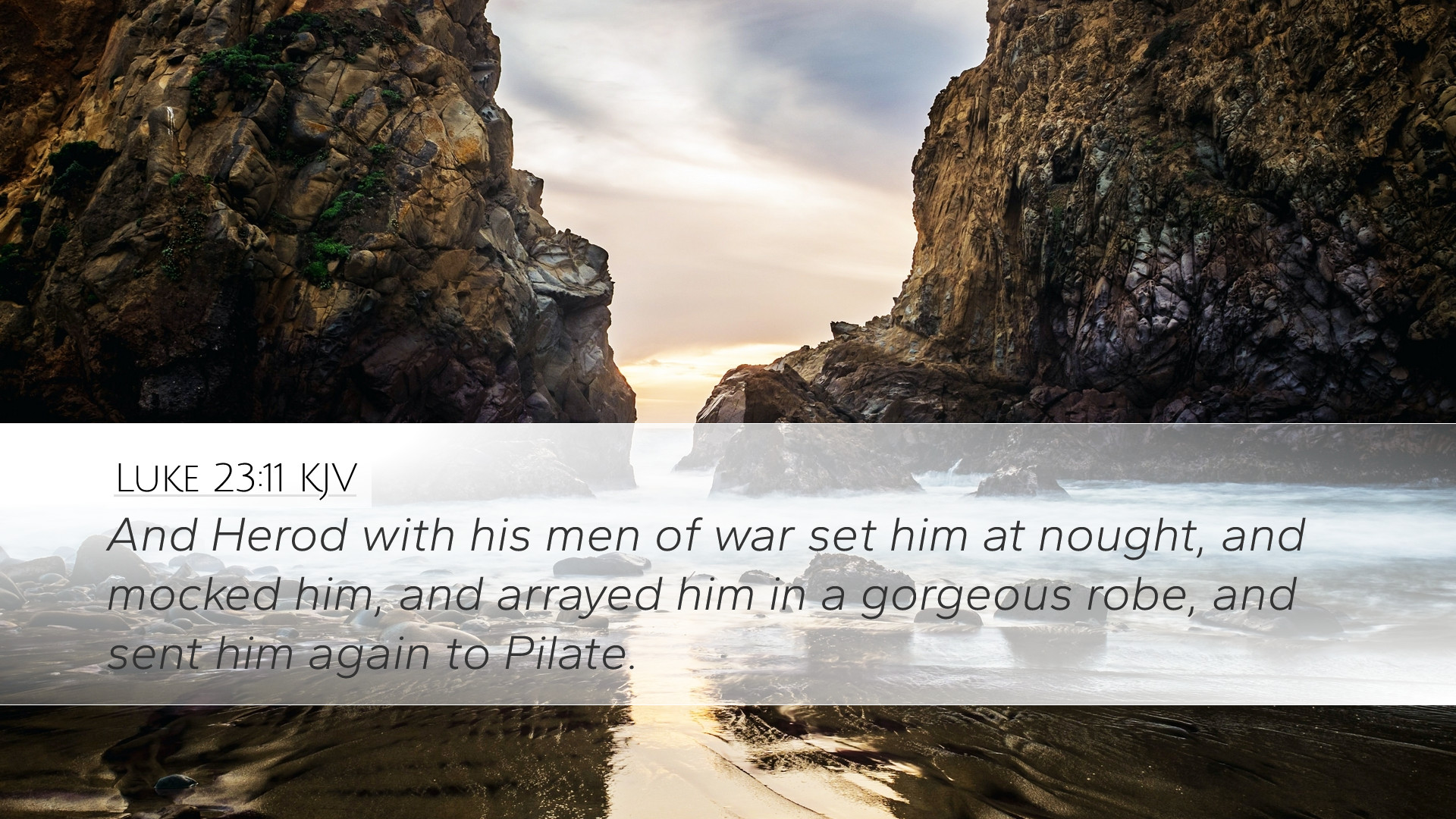Bible Commentary on Luke 23:11
Verse: "And Herod with his men of war set him at nought, and mocked him, and arrayed him in a gorgeous robe, and sent him again to Pilate." (Luke 23:11)
Introduction
This passage occurs during the trial of Jesus, as He is brought before Herod Antipas, the ruler of Galilee. Deeply intertwined with historical and theological context, this verse reveals profound insights into the political and spiritual landscape of Jesus’ time.
Contextual Background
The interactions between Jesus and Herod are significant as they highlight the indifference and mockery faced by Christ from the ruling authorities. Herod, known for his fickleness and cruelty, represents a political entity that is skeptical and derisive of spiritual truths.
Political Dynamics
This verse underscores the political turmoil and the lack of genuine judicial process present during Jesus' trial. As Matthew Henry observes, “Herod’s conduct exemplifies the folly and wickedness of those who ridicule sacred matters.”
Religious Implications
The scorn shown by Herod illustrates the spiritual blindness that often accompanies human authority. Albert Barnes notes that Herod’s mockery is a reflection of the broader rejection of Jesus by those in power, fulfilling the prophecies of the Messiah's suffering as foretold in Isaiah.
Analysis of Key Elements
Herod's Mockery
The act of setting Jesus at nought and mocking Him is emblematic of the world's contempt for the divine. Adam Clarke emphasizes this mockery as an indication of Herod’s arrogance and disbelief in Jesus’ true identity as the King of Kings. The “gorgeous robe” that Jesus was arrayed in is particularly significant; it was a symbolic gesture to mock the claim of Jesus as king.
The Gorgeous Robe
The robe represents the twisted humor of Herod and serves to further humiliate Jesus. This moment serves as a poignant reminder of the world’s tendency to trivialize sacred concepts. Matthew Henry points out, “They crowned Him with thorns, but Herod crowned Him with a robe of ridicule.”
Theological Implications
This moment in the narrative illustrates significant theological themes, such as the juxtaposition of human authority versus divine sovereignty. Despite being mocked and scorned, Jesus remains in control of His mission, highlighting His profound humility and purpose.
The Sovereign Plan of God
Barnes remarks that what was meant for evil serves the divine purpose of redemption. This underscores the belief that even through human injustice and mockery, God's sovereign plan prevails—a cornerstone of Christian faith.
Fulfillment of Prophecy
The mockery of Jesus before Herod can also be viewed as a fulfillment of prophetic scripture, linking back to Isaiah and the Psalms. The disdain shown towards Him aligns with the anticipated suffering Messiah, showing that ridicule and rejection were part of the redemptive narrative.
Lessons for Today
For modern readers, Luke 23:11 offers profound lessons regarding faith in the face of mockery. Believers may often encounter derision in their pursuit of Christ, yet this shouldn't deter their commitment to truth.
Steadfastness in Faith
The mockery that Jesus faced serves as an encouragement for believers to remain steadfast in their faith. Just as Jesus endured scorn, His followers are called to bear their crosses with grace and dignity. Clarke suggests that such trials center the believer's focus on heavenly things rather than earthly scorn.
The Nature of True Leadership
The behavior of Herod exemplifies the pitfalls of worldly power detached from righteousness. Followers of Christ are reminded that true leadership is rooted in humility, service, and sacrifice, contrasting sharply with Herod's arrogance.
Conclusion
Luke 23:11 encapsulates a critical moment in the narrative of Christ's passion, revealing the profound mockery He faced. By examining this verse through the lenses of esteemed commentators such as Matthew Henry, Albert Barnes, and Adam Clarke, readers gain valuable insights into the dynamics of power, faith, and the fulfillment of God’s redemptive plan. This moment in scripture not only serves as a historical account but also invites reflection on the character of Jesus and the nature of His kingdom, inviting believers to embrace the truths found in His humility and steadfast devotion, even in the face of worldly scorn.


